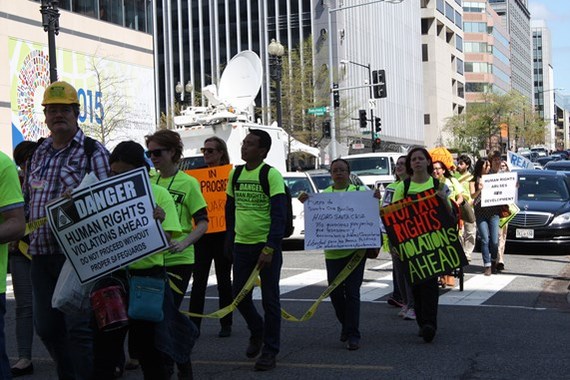On May 26, 2016, sixty-nine civil society organizations (CSOs) from twenty-six countries urged the World Bank to maintain transparency throughout the ongoing review of its environmental and social protection policies, or safeguards. In a joint letter to World Bank management, the signatories requested that the final draft of the World Bank safeguards package be publicly disclosed at the same time that it is shared with the Board for review. This would allow them to discuss the content with their elected representatives before the World Bank Board seeks out the final opinions of member governments.
The letter makes clear that civil society is still very much engaged in the policy review, the outcome of which will determine the environmental and social standards to which both the Bank and its borrowers are held. "As we are all aware," the letter reads, "the new safeguard policy will have enormous implications for human rights and environmental integrity in Bank-sponsored development."
World Bank Management's responses to the letter indicate that it recognizes its obligation to disclose the final draft policy. According to the World Bank Access to Information (AI) Policy, operational policy papers prepared following a public consultation process must be disclosed after submission to the Board and before the approval date.
Unfortunately, loopholes in the AI policy will allow the final safeguards draft to be deliberated internally within a Board subcommittee, even though the entire Board will likely be privy to/involved in these negotiations. By the time the draft is officially submitted to the whole Board, a consensus will likely be more or less reached. So far, Bank Management has not shown willingness to prioritize public interest in the document and publish it at the same time it is shared with government shareholders.
True transparency requires that information is disclosed in such a way that stakeholders can meaningfully affect change. The World Bank, which uses public money to fund policies and projects that affect the poorest and most vulnerable, should be the leading global example. Instead, it continues to hide behind loopholes for the sake of efficiency and expediency.
Many of the organizations that endorsed the letter have been following the review of the safeguards policies for the past four years. They have submitted detailed and lengthy written comments, given impassioned statements at global consultation meetings, and have even peacefully taken to the streets to make their voices heard.
 Caption: Civil Society organizations protesting World Bank's human rights policy protections in front of World Bank HQ in Washington DC/April 2015 (Photo credits: Natalia Margolis)
Caption: Civil Society organizations protesting World Bank's human rights policy protections in front of World Bank HQ in Washington DC/April 2015 (Photo credits: Natalia Margolis)
Why? Because weakened safeguards at the Bank would mean weakened protections for those who most often experience the 'externalities' of development projects. While their governments boast increases in private investment and energy exports, communities suffer displacement, pollution and loss of livelihoods. Strong safeguards help prevent them from falling victim to development's dark side.
According to letter signatories, "The ultimate decision on this policy will see the best result if it is taken in a fully transparent and informed manner." The fight for strong safeguards can only continue if civil society's engagement in the review of the policy is legitimized in this last crucial stage. And that means the Bank needs to look past the loopholes and disclose the draft when civil society inputs can still have an impact.
Co-authored by Margaret Federici, Campaigns Associate at Bank Information Center
